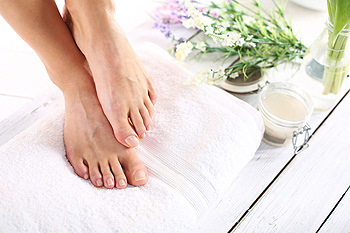 Many people experience the feeling of their feet “falling asleep” after an extended period of inactivity. This feeling is the result of prolonged pressure on the nerves or blood vessels that supply them. However, once the pressure is gone, the sensation immediately disappears. This entire process is commonly referred to as having poor circulation in the feet. If you are looking to “wake up your feet” when they fall asleep, one of the best ways to do so is by giving them a massage. Massages help stimulate your nerves and muscles while improving circulation. The massage should be done by using warm olive oil and using circular motions to rub your feet. Another way to wake up your feet is to soak a cloth in warm water and apply it to your feet. This will help increase blood flow to the area and nerves. If you are struggling with poor circulation in your feet, it will help to speak with a podiatrist to determine the best treatment method for you.
Many people experience the feeling of their feet “falling asleep” after an extended period of inactivity. This feeling is the result of prolonged pressure on the nerves or blood vessels that supply them. However, once the pressure is gone, the sensation immediately disappears. This entire process is commonly referred to as having poor circulation in the feet. If you are looking to “wake up your feet” when they fall asleep, one of the best ways to do so is by giving them a massage. Massages help stimulate your nerves and muscles while improving circulation. The massage should be done by using warm olive oil and using circular motions to rub your feet. Another way to wake up your feet is to soak a cloth in warm water and apply it to your feet. This will help increase blood flow to the area and nerves. If you are struggling with poor circulation in your feet, it will help to speak with a podiatrist to determine the best treatment method for you.
While poor circulation itself isn’t a condition; it is a symptom of another underlying health condition you may have. If you have any concerns with poor circulation in your feet contact Jim Maxka, DPM of South Penn Foot & Ankle Associates. Our doctor will treat your foot and ankle needs.
Poor Circulation in the Feet
Peripheral artery disease (PAD) can potentially lead to poor circulation in the lower extremities. PAD is a condition that causes the blood vessels and arteries to narrow. In a linked condition called atherosclerosis, the arteries stiffen up due to a buildup of plaque in the arteries and blood vessels. These two conditions can cause a decrease in the amount of blood that flows to your extremities, therefore resulting in pain.
Symptoms
Some of the most common symptoms of poor circulation are:
- Numbness
- Tingling
- Throbbing or stinging pain in limbs
- Pain
- Muscle Cramps
Treatment for poor circulation often depends on the underlying condition that causes it. Methods for treatment may include insulin for diabetes, special exercise programs, surgery for varicose veins, or compression socks for swollen legs.
As always, see a podiatrist as he or she will assist in finding a regimen that suits you. A podiatrist can also prescribe you any needed medication.
If you have any questions, please feel free to contact our office located in Hanover, PA . We offer the newest diagnostic and treatment technologies for all your foot care needs.
